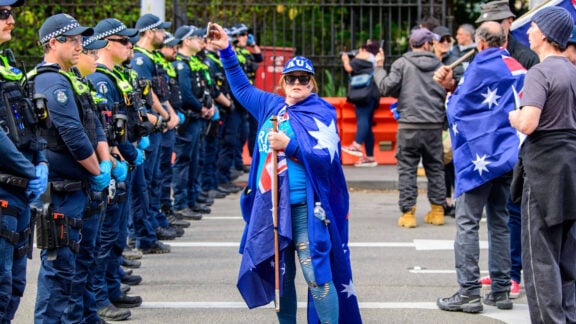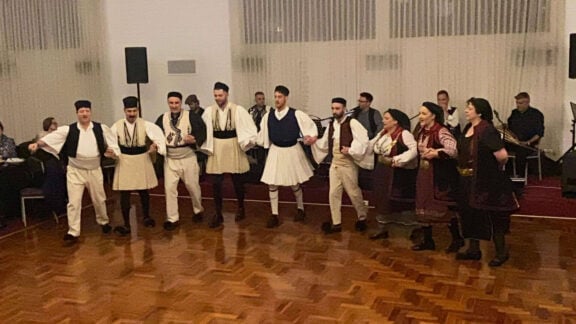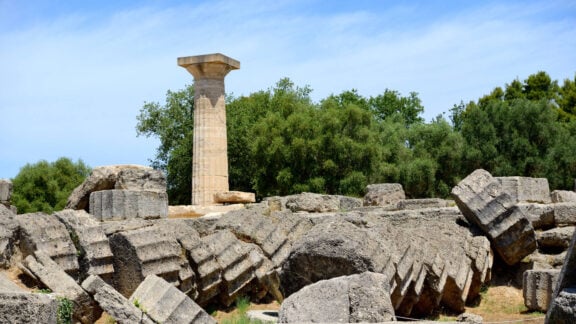For most, Greece is the perfect travel destination, a place rich in history, the breathtaking and tranquil scenery a dream.
But not for Athenian turned Sydneysider academic Vrasidas Karalis.
“When you go to Greece you have an idea that you’re going to go to a place where everything is quiet, that everything’s tranquil and these kinds of things, right?” Professor Karalis tells Neos Kosmos.
“I describe it as violent, violent Greece, a society in constant implosion,” he says.
While walking through the centre of Athens in 2011, he became a witness to the burning down of one of Athens’ oldest and most beautiful buildings, the cinema Attikon.
“Think about it: you’re in Sydney and you see the Opera House on fire. It’s a monumental event, especially for us who grew up in there. We used to go to the cinema three times a week.
“One of the most beautiful buildings on fire and you’re having people dancing around it, being happy for doing that. How would you feel?”
That moment marked the end of Greek civil society as the professor knew it, and put the wheels in motion for him to start writing The Demons of Athens.
Launched last month by Mary Kostakidis at Gleebooks in Sydney, the book follows a documentary fiction style narrative, written in the first person and divided into 31 days centred in the Greek capital.
The narrator embarks on a journey from Australia to Athens during the current economic crisis, which he refers to as the ‘great devastation’ of Greece.
At its heart, the book is about conversations. Conversations the narrator has with locals, politicians and old friends; all which lead him to come to a broad conclusion on the state of Greece and its future prospects.
“The book is about Athens, about the landscape, the cityscape of Athens and the impact that the crisis has on the city,” says Professor Karalis.
The narrator is captivated by lifelike snapshots from various real-life events that explore the poverty of ordinary people and the blunt and confronting views of politicians.
According to Professor Karalis this is a book for “people who want to know the truth”.
“Not illusion. Not fantasy. Somebody has to tell you the truth. People don’t have an idea about Greece, they have a fantasy about Greece. Most of them go there for thirty days as tourists and they think they know the truth about the country, but I know the country inside out,” he says.
For the professor this was a significant project, one which he needed to complete for people to truly understand the impact of the crisis on the daily life of ordinary people on all levels. He wanted to convey the emotional impact on the mentality and self-perception of contemporary Greeks.
Known to be spontaneous, expressive and extroverted, according to the professor the Greeks are now the opposite of that, lacking in their creative imagination.
“Imagination means an opening to the future as you understand. So the urgency of the situation created this fear and insecurity, people became introverted, very sort of unable to communicate, unable to express their innermost feelings,” he says.
And this is where the title is derived. The Demons of Athens finds its inspiration in political novel The Demons by Fyodor Dostoyevsky.
So three years after embarking on the novel, how does the professor see the situation in Greece?
“Worse,” he says bluntly.
“Six years after the crisis, have they done anything to redress the problem? No, everybody knows that. Don’t pay any attention to statistics. The reality is that people have less money and the quality of life has fallen by 30 to 40 per cent.”
As a transnational and transcultural individual, Professor Karalis has the ability to view and address the issue with the knowledge and experience of an insider but the objectivity of an outsider.
The Demons of Athens is unique in the opinions it expresses and does not isolate the economic crisis of Greece as solely a Greek issue; rather, it is addressed to the wider community, namely Australia.
But finally, how will things in Greece improve?
“The people are traumatised, deeply traumatised and it’s a trauma that’s not going to go away easily or any time soon. These people are suffering. I’m not against them.
“The people who created the crisis are still governing the country, so I have every reason to be pessimistic. As long as you hear the same names defining the parameters of conversation that we have in the country, has anything changed?”
The Demons of Athens is now available for purchase online at www.gleebooks.com.au for $26.95
*Professor Vrasidas Karalis is the Sir Nicholas Laurantus Professor and Chair of the Modern Greek Department at the University of Sydney.









